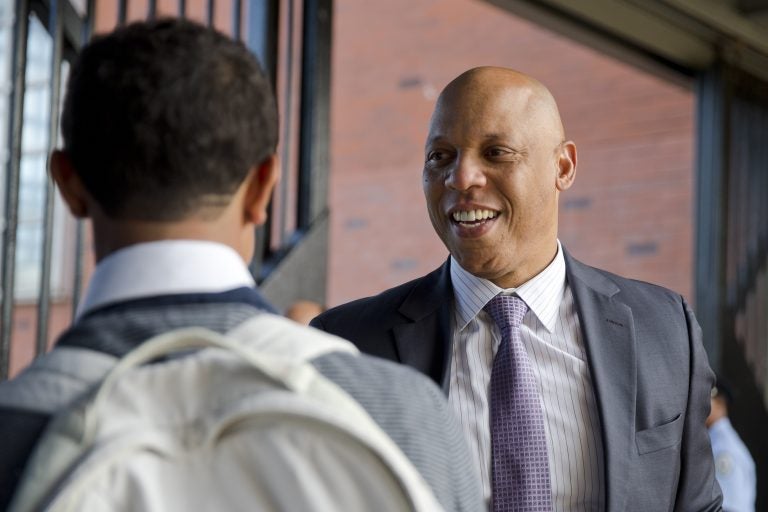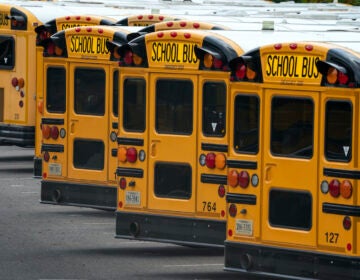Heading into 8th year, Philly schools chief Hite wants to ‘think about reform differently’
Hite says steady progress and stability is the recipe for Philly schools. But is that type of change powerful enough for the long-struggling system?

In this file photo, Superintendent William Hite meets with a student outside of a high school, Monday, Sept. 8, 2014, in Philadelphia. (Matt Rourke/AP Photo)
With each passing year, the story of William Hite’s tenure as Superintendent of the School District of Philadelphia becomes more and more about how long that tenure has lasted.
Hite will begin his eighth year leading the region’s largest school district, a rare feat among superintendents in large, high-poverty school systems.
“I do think too often urban school districts are whipped around with new leadership that will come and create a different direction,” said Hite in a back-to-school-year interview with WHYY.
Hite has preached a message of stability, especially since the district crawled out of a fiscal crisis that plagued the early years of his superintendency.
There are no labor disputes to cloud the beginning of the ‘19-’20 school year. Nor are there any impending budget crunches. The district continues to slowly replace positions lost during the last financial crisis, while maintaining its emphasis on academic areas it deems critical — such as early literacy.
“Part of this work is to think about reform differently, and to think about reform as the way to those evidence-based things that we know work with fidelity,” Hite said.
Is Hite’s steady approach working?
The school’s chief points to third-grade reading scores on the state’s standardized test, which have gone up for three straight years. Graduation rates have inched up, too, he notes. And lenders no longer see the district’s balance sheet as a total stinker, as evidenced by three credit-score upgrades.
Big picture, though, is that enough?
About two in three third-graders in Philadelphia still don’t read on grade level. The district’s looking at a deficit again in fiscal year 2022 without more money from the state, city, or both.
Hite says there is urgency about those things, but that upheaval won’t help. He believes that right now — for this particular school system — consistency is key.
“It’s just an acknowledgement that these things are hard and it takes sustained effort,” he said.
Closely watched planning process kicks off
As part of Hite’s plan to chart a steady path forward, the district will institute a brand new planning process this year. It will draw lots of scrutiny, in part because it’s new and it part because it could result in school boundary changes, school expansions, or even school closures.
Most schools won’t be part of this pilot effort. The plan is to evaluate all schools on a rolling, four-year basis.
Hite has wanted to do something like this ever since he arrived, he said.
“Part of this is really to look at how we address and how we direct our limited capital dollars,” Hite said. “But the other part of it is to ensure we never get back to a situation where we get to one year where we have to make decisions for a lot of schools all at once.”
The district did just that shortly after Hite arrived, shuttering about two dozen schools amid money woes.
Hite believes a scheduled planning process will help Philadelphia avoid that kind of disruption in the future. But it’s unclear exactly what kind of criteria the district and school board will use when determining whether to change boundary lines, open new schools, or close underused ones.
The district has said local planning councils will have a lot of influence in those big decisions. Ultimately, though, the newly-created school board will have final say.
What about diversity?
One question is whether the district will use its new planning process to encourage school integration.
So far the district has been mostly mum on that topic, saying it will defer to the priorities of local planning groups.
“The diversity kind of follows a neighborhood pattern and a housing pattern,” said Hite. “So I would like to see schools that are more diverse. But we’re not leading with that question.”
Just up I-95 in New York City, school segregation has been a hot topic. Late last month, a mayoral panel recommended dismantling the city’s network of gifted programs and special admissions schools in order to encourage integration.
Philadelphia has some of the same dynamics. White and Asian children make up about two-thirds of all students at competitive magnet schools like Masterman and Central High Schools, while Black and Hispanic students are significantly under-represented.
Hite, though, doesn’t want Philly to implement the changes proposed in New York City.
“I’m not interested in getting rid of our special admissions programs,” said Hite. “I think they serve a purpose. I think all of the learning needs of our children are unique and we need to have programs that are also unique to those young people.”
Instead, Hite wants the district to do a better job making sure students are aware of gifted programs and tested in such a way that reduces racial bias. A 2017 report by the Pew Charitable Trusts found that some groups of students — such as Hispanic males — don’t apply for programs for which they’re academically qualified.
The district is now doing a better job notifying students who have the grades to enter a specialized program, Hite said.
The charter question looms
Philadelphia school leaders will also have their eye this year on Harrisburg, where the charter school debate recently took a left turn.
Gov. Tom Wolf announced last month that he would use his executive authority to make some changes that many charter leaders consider onerous.
Any change on the charter front means a lot in Philadelphia, which has by far the most charter school students of any school district in Pennsylvania.
Hite and school board chair Joyce Wilkerson recently wrote an op-ed urging changes to the charter school law. Much of that piece aligned philosophically with the proposals Wolf recently unveiled.
And Hite’s a fan of Wolf shaking up the charter debate.
“What the governor has done is say ‘hey we have to fix this,’” he said.
WHYY is your source for fact-based, in-depth journalism and information. As a nonprofit organization, we rely on financial support from readers like you. Please give today.





